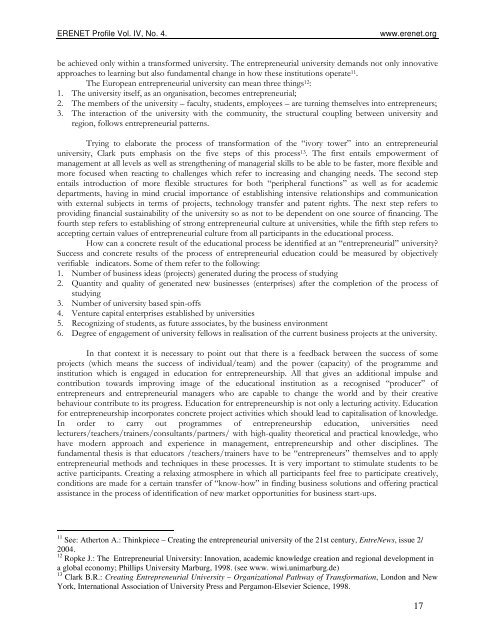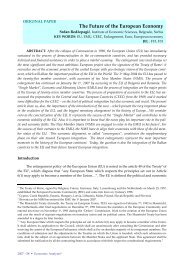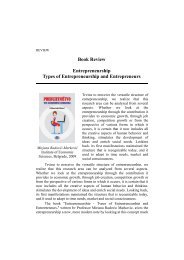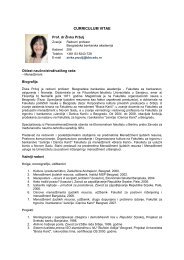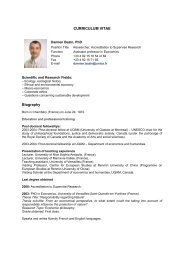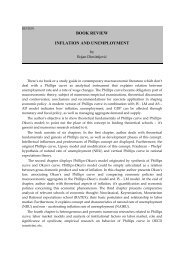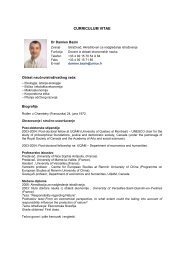Issue 16
Issue 16
Issue 16
Create successful ePaper yourself
Turn your PDF publications into a flip-book with our unique Google optimized e-Paper software.
ERENET Profile Vol. IV, No. 4.<br />
www.erenet.org<br />
be achieved only within a transformed university. The entrepreneurial university demands not only innovative<br />
approaches to learning but also fundamental change in how these institutions operate 11 .<br />
The European entrepreneurial university can mean three things 12 :<br />
1. The university itself, as an organisation, becomes entrepreneurial;<br />
2. The members of the university – faculty, students, employees – are turning themselves into entrepreneurs;<br />
3. The interaction of the university with the community, the structural coupling between university and<br />
region, follows entrepreneurial patterns.<br />
Trying to elaborate the process of transformation of the “ivory tower” into an entrepreneurial<br />
university, Clark puts emphasis on the five steps of this process 13 . The first entails empowerment of<br />
management at all levels as well as strengthening of managerial skills to be able to be faster, more flexible and<br />
more focused when reacting to challenges which refer to increasing and changing needs. The second step<br />
entails introduction of more flexible structures for both “peripheral functions” as well as for academic<br />
departments, having in mind crucial importance of establishing intensive relationships and communication<br />
with external subjects in terms of projects, technology transfer and patent rights. The next step refers to<br />
providing financial sustainability of the university so as not to be dependent on one source of financing. The<br />
fourth step refers to establishing of strong entrepreneurial culture at universities, while the fifth step refers to<br />
accepting certain values of entrepreneurial culture from all participants in the educational process.<br />
How can a concrete result of the educational process be identified at an “entrepreneurial” university?<br />
Success and concrete results of the process of entrepreneurial education could be measured by objectively<br />
verifiable indicators. Some of them refer to the following:<br />
1. Number of business ideas (projects) generated during the process of studying<br />
2. Quantity and quality of generated new businesses (enterprises) after the completion of the process of<br />
studying<br />
3. Number of university based spin-offs<br />
4. Venture capital enterprises established by universities<br />
5. Recognizing of students, as future associates, by the business environment<br />
6. Degree of engagement of university fellows in realisation of the current business projects at the university.<br />
In that context it is necessary to point out that there is a feedback between the success of some<br />
projects (which means the success of individual/team) and the power (capacity) of the programme and<br />
institution which is engaged in education for entrepreneurship. All that gives an additional impulse and<br />
contribution towards improving image of the educational institution as a recognised “producer” of<br />
entrepreneurs and entrepreneurial managers who are capable to change the world and by their creative<br />
behaviour contribute to its progress. Education for entrepreneurship is not only a lecturing activity. Education<br />
for entrepreneurship incorporates concrete project activities which should lead to capitalisation of knowledge.<br />
In order to carry out programmes of entrepreneurship education, universities need<br />
lecturers/teachers/trainers/consultants/partners/ with high-quality theoretical and practical knowledge, who<br />
have modern approach and experience in management, entrepreneurship and other disciplines. The<br />
fundamental thesis is that educators /teachers/trainers have to be “entrepreneurs” themselves and to apply<br />
entrepreneurial methods and techniques in these processes. It is very important to stimulate students to be<br />
active participants. Creating a relaxing atmosphere in which all participants feel free to participate creatively,<br />
conditions are made for a certain transfer of “know-how” in finding business solutions and offering practical<br />
assistance in the process of identification of new market opportunities for business start-ups.<br />
11 See: Atherton A.: Thinkpiece – Creating the entrepreneurial university of the 21st century, EntreNews, issue 2/<br />
2004.<br />
12 Ropke J.: The Entrepreneurial University: Innovation, academic knowledge creation and regional development in<br />
a global economy; Phillips University Marburg, 1998. (see www. wiwi.unimarburg.de)<br />
13 Clark B.R.: Creating Entrepreneurial University – Organizational Pathway of Transformation, London and New<br />
York, International Association of University Press and Pergamon-Elsevier Science, 1998.<br />
17


